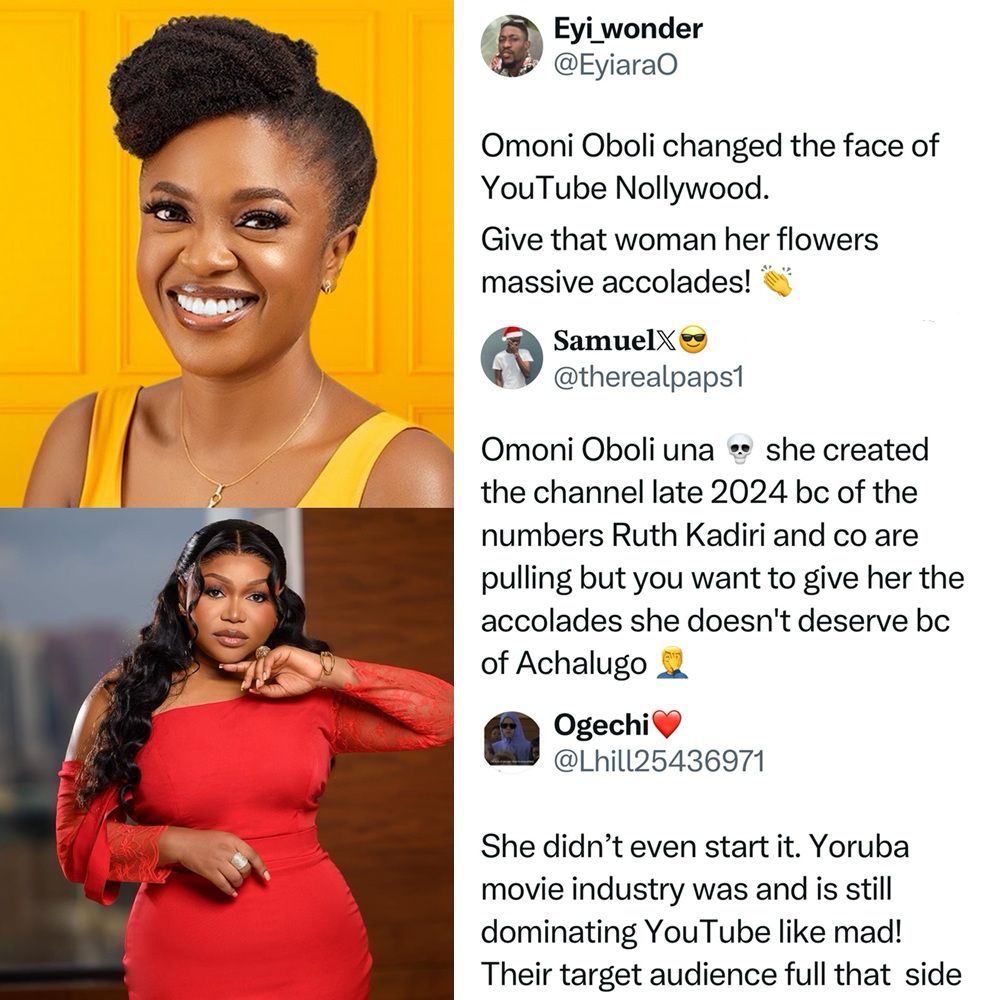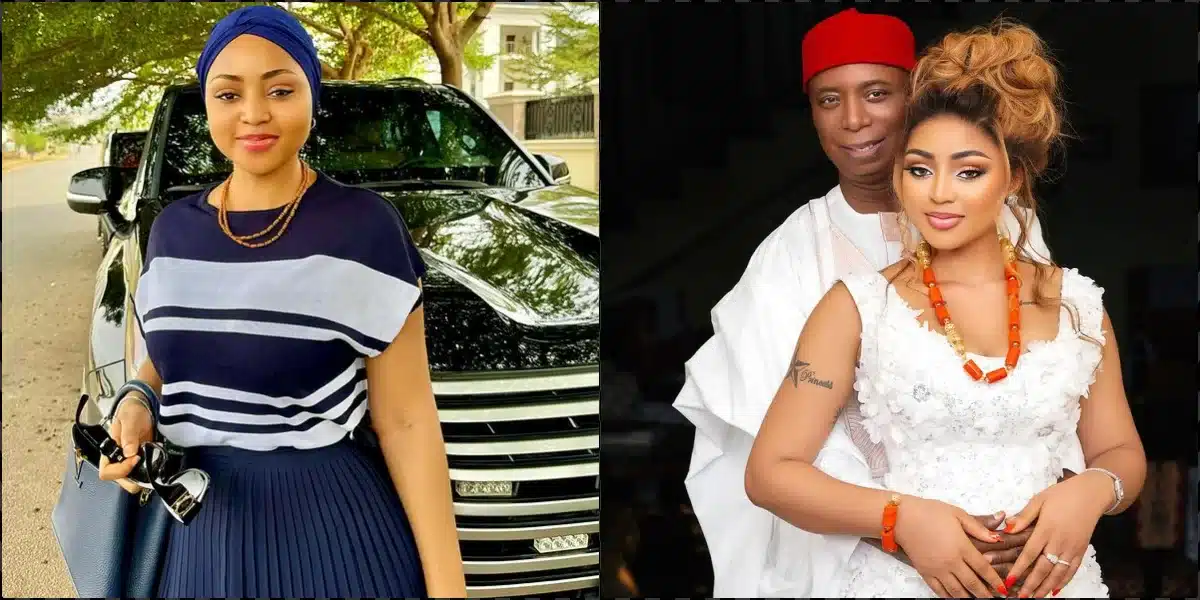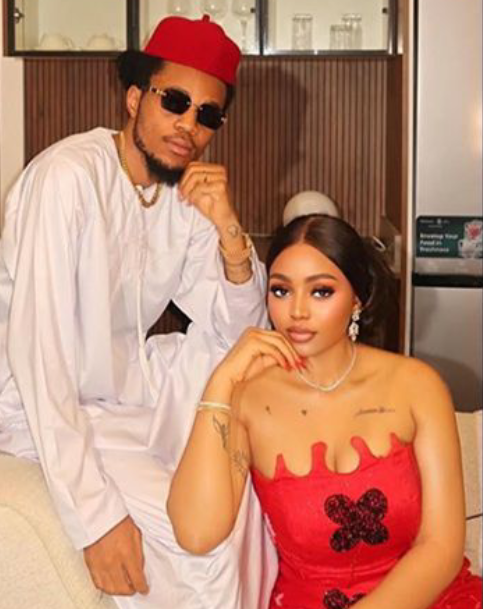
“Give That Woman Her Flowers!”: Social Media Erupts as Fans Debate Omoni Oboli’s Role in YouTube Nollywood Revolution

A social media storm erupted this week following a viral post claiming that actress and filmmaker Omoni Oboli “changed the face of YouTube Nollywood,” sparking heated conversations among fans and industry watchers about credit, contribution, and the real pioneers of the YouTube movie movement in Nigeria.
It all began with a seemingly innocuous tweet that read, “Omoni Oboli changed the face of YouTube Nollywood. Give that woman her flowers, massive accolades!” The bold statement, credited to a user known as SamuelX (@therealpaps1), was met with a mix of admiration and outrage, sending shockwaves through the Nollywood online community. Within hours, it climbed the trending charts, with thousands of retweets, likes, and sharp responses.
Some social media users rallied in support of the statement, insisting that Omoni Oboli’s recent film Achalugo posted on her YouTube channel had reinvigorated interest in high-quality Nollywood productions on the platform. They argue that her entry into YouTube filmmaking has brought a fresh wave of attention and professionalism, giving mainstream Nollywood a new avenue to reach millions directly without the traditional barriers of cinema or DSTV exclusivity.
But not everyone was clapping. One vocal critic, Ogechi (@Lhill25436971), dismissed the accolades being thrown Omoni’s way. “Omoni Oboli una? She created the channel late 2024 bc of the numbers Ruth Kadiri and co are pulling but you want to give her the accolades she doesn’t deserve bc of Achalugo,” she wrote, stirring a strong wave of agreement from others who believe that the actress is simply riding the wave of a trend already established by other female filmmakers.
Indeed, names like Ruth Kadiri, Uche Nancy, and Mercy Johnson have become synonymous with the evolution of YouTube Nollywood, especially among non-Yoruba-speaking audiences. Ruth Kadiri, in particular, has amassed a loyal following for her consistent releases, emotionally charged plots, and family-oriented themes, helping carve out a serious niche on the platform long before Omoni Oboli's arrival.
Adding fuel to the fire was another user, wonder (@EyiaraO), who emphasized the longstanding dominance of the Yoruba movie industry on YouTube. “She didn’t even start it. Yoruba movie industry was and is still dominating YouTube like mad! Their target audience full that side,” they wrote, referencing the rich ecosystem of Yoruba-language films that have thrived on YouTube for years, supported by a dedicated and often underestimated fanbase.
In truth, the YouTube Nollywood space has been bubbling with content long before Omoni Oboli made her official debut. From Asaba movie content creators to Yoruba-language producers, a wide range of filmmakers have been uploading films, building subscriber bases, and creating careers around direct-to-YouTube distribution. The platform has become a fertile ground for stars who may not always headline cinema blockbusters but are household names in countless Nigerian homes.
However, supporters of Omoni Oboli are not backing down. They argue that what she brings to the table is a different kind of quality, storytelling finesse, and intentional branding. Her entry, though relatively recent, comes with a cinematic approach rarely seen on the platform. Her films, they say, have a polished production value that reflects her experience in traditional Nollywood, with attention to detail, clean cinematography, and well-crafted plots.
Still, many wonder whether that alone qualifies as “changing the face” of YouTube Nollywood. Critics argue that the space was already shifting long before she arrived, and that pioneers like Ruth Kadiri and Uche Nancy—both actors and producers—were the ones who laid the groundwork and created a template that others, including Oboli, are now following.
The timing of Oboli’s entry into the platform hasn’t helped her case either. Her YouTube channel was created in late 2024, around the time when other stars were already pulling millions of views per movie. That timeline has become a focal point for detractors, who insist that her contributions, while commendable, are far too recent to earn her the title of a trailblazer.
But to some, that’s missing the point. The phrase “changed the face” doesn’t necessarily imply being first—it can also mean elevating, redefining, or adding a new dimension. In that light, Oboli’s defenders say she has indeed brought a kind of prestige to the platform that challenges the notion of YouTube as a dumping ground for “lesser” movies. They argue that her presence alone validates the platform and may encourage more A-list Nollywood actors and producers to follow suit, thereby expanding the ecosystem.
This isn’t the first time Nollywood fans have clashed over who deserves accolades. As digital platforms reshape entertainment consumption, questions of recognition, credit, and innovation become more complex. In a space where views can be bought, engagement can be manipulated, and virality isn’t always a sign of quality, determining who the true changemakers are is no easy feat.
What remains undeniable is that YouTube has become an important player in Nigeria’s film industry. It has democratized access to content, allowed filmmakers to bypass traditional gatekeepers, and opened new revenue streams through ad monetization and brand partnerships. Whether Omoni Oboli is the face of that revolution or simply a welcomed contributor is still up for debate.
What this online frenzy has revealed, more than anything, is just how passionate audiences are about Nollywood. Fans are no longer just viewers—they’re analysts, historians, and critics. And as Nollywood continues to evolve in the digital age, one thing is clear: the battle for credit, relevance, and influence will not be ending anytime soon.
For now, the conversation continues. But if nothing else, Omoni Oboli’s entrance has sparked a necessary discourse—one that shines a spotlight on the women redefining Nigerian cinema on their own terms, one YouTube upload at a time. Whether you think she changed the face or merely added to it, one thing’s for sure: people are watching, talking, and re-evaluating what makes a true game-changer in 21st century Nollywood.


